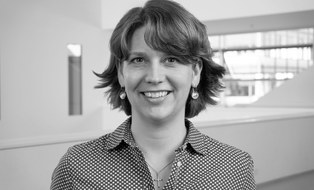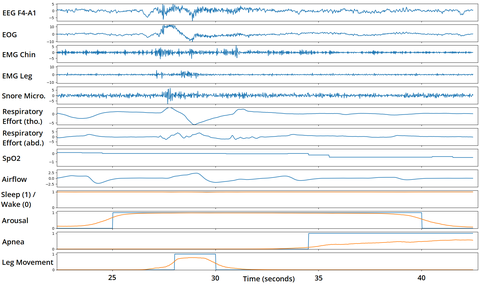Anwendungsschwerpunkt Schlafforschung und Schlafmedizin
Vision
Die Schlafmedizin ist eine vielseitige medizinische Disziplin, die umfangreiche und aufwendige Untersuchungen umfasst. Dabei werden große Datenmengen erhoben, deren manuelle Auswertung oft nur an der Oberfläche des potenziellen Informationsgehalts kratzt. Um das volle Potenzial dieser Daten auszuschöpfen, sind Methoden aus Data Science und Datenintegration unerlässlich.
Die Datenintegration ermöglicht durch Harmonisierung und Digitalisierung die Auswertung großer Datenmengen und eröffnet weitergehende Analysemöglichkeiten. Data Science kann auf zwei Arten unterstützen: (1) durch Automatisierung, die Expert:innen bei der Auswertung entlastet, und (2) durch die Untersuchung neuer Parameter und explorative Analysen, die dazu beitragen, neue Zusammenhänge und Informationen in den Daten zu entdecken. Diese und weitere Aspekte sind Teil unserer Arbeit in diesem Anwendungsschwerpunkt.
Bei der Polysomnographie werden verschiedene Signale wie Elektroenzephalogramm (EEG), Elektrookulogramm (EOG) und Elektromyogramm (EMG) aufgezeichnet. Für die medizinische Beurteilung werden in den Signalen manuell Zustände und Ereignisse wie Schlaf, Arousal und Apnoen annotiert. Wir forschen daran, wie diese manuellen Annotation durch Deep Learning Modelle automatisiert durchgeführt werden können. Im Bild sind in den oberen Kanälen die Biosignale zu sehen, in den unteren Kanälen werden manuelle Annotation und automatisierte Klassifikation gegenüber gestellt.
Schwerpunkte
- Klassifikation von Schlafstadien aus kardiorespiratorischen Signalen
- Arousaldetektion
- Kombination von Klassifikatoren und Detektoren für einen vollständigen, automatisierten Schlafreport aus dem Polysomnogramm
- Untersuchung neuer Parameter zur Analyse und Bewertung des Schlafs (Delta Power, Hypoxic Burden, ...)
Ansprechpartnerin
 © UKD/Michael Kretzschmar
© UKD/Michael Kretzschmar
wissenschaftliche Mitarbeiterin
NameFrau Dr.-Ing. Miriam Goldammer
Eine verschlüsselte E-Mail über das SecureMail-Portal versenden (nur für TUD-externe Personen).
Ausgewählte Projekte
-
Somnolink — Entwicklung von Klassifikations- und Vorhersagemodellen im Kontext der Schlaf-Apnoe
- Sleep Harmonizer — Harmonisierung von Polysomnogrammen und ihren Annotationen, inkl. Erzeugung neuer, harmonisierter Datensätze im EDF+-Format

